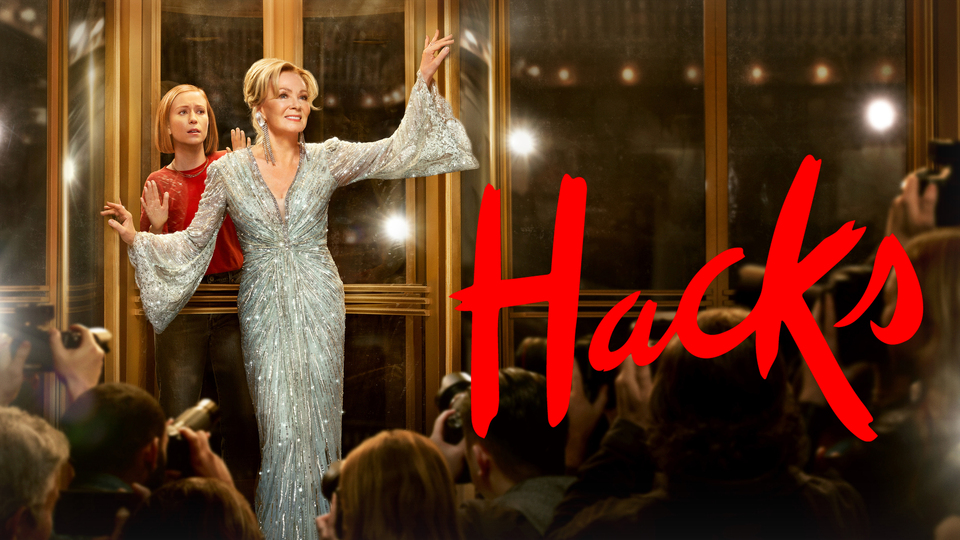Viewers’ introduction to Deborah Vance, played by Jean Smart, is of the aging comedian on stage, resplendent in her signature glitter, telling the final joke of her set for what we soon discover is her very long-running Vegas residency at the Palmetto. A montage follows showing Deborah’s various side hustles – private jetting off to QVC sales, a Christmas photoshoot, and home with only her wig stand and corgis to keep her company. Over lunch the next day with Marty Ghilain, owner of the Palmetto played by Christopher McDonald, Deborah is informed that the Palmetto will no longer play host to her act. She, of course, flies off the handle, but more importantly, she must grapple with her own relevance in a world that is less than kind to older women in show business.
 Source: HBO Max
Source: HBO Max
Enter Ava Daniels, a newly unemployed, elder Gen-Z television writer played by Hannah Einbinder. After an off-color tweet about a hypocritical politician’s sexuality, Ava is a pariah among the Hollywood circles with which she’s used to running. Jimmy LuSaque Jr., both Ava’s and Deborah’s manager played by Hacks co-creator Paul W. Downs, seems to have the perfect solution to his clients’ problems: Ava is sent to interview to be Deborah’s writer. To be clear, Ava does not want to be Deborah’s writer, and Deborah does not think she needs a writer. Though the interview could not have gone worse, Deborah hires Ava, and so Hacks begins.
As Hacks, which just finished its fourth season, progresses, the plot explores the employment relationship between Deborah and Ava; no matter how familiar the pair may behave with each other, Deborah is always Ava’s boss. Because of the haphazard way this duo was thrown into a working relationship, it is no surprise that there is a complete lack of defined job responsibilities for Ava. Certainly, her main responsibilities could be summed up as “be funny” and “write that down!” But Deborah’s comedy is rooted in her life, so Ava needs to get to know Deborah in order to evaluate how Deborah, whose act needs a revamp if she is going to continue performing after her 2,500th and final show at the Palmetto, can best stage her comeback to the mainstream.
If Deborah had a good HR person on her payroll, then she would have been advised from the start of Ava’s employment about the necessity of clearly defining an employee’s role and responsibilities. Instead, Deborah and Ava’s lives blur together, complicated by the power Deborah holds over Ava such that Ava finds herself in positions clearly outside the bounds of a comedy writer. When Deborah decides she wants an antique salt and pepper shaker set to add to her collection, but the seller is a man who has banned Deborah from his store and refuses to sell to her, she sends Ava – not one of the many other people on her payroll more suited to this type of task – in to try and buy the set. And when the car breaks down in the Nevada desert on the way back from the store, Ava is made to wait for repairmen while Deborah takes a helicopter home. Even a task that ultimately helps Ava unravel the inner workings of Deborah’s mind – long hours spent digitizing Deborah’s entire comedy catalogue for a QVC DVD showcasing the best of Deborah – is framed as outside the scope of Ava’s employment, as she repeatedly vents to Jimmy, because the task was a punishment after Ava called out Deborah’s unwillingness to allow Ava to help craft Deborah’s second act (and, a little bit, as a punishment for Ava’s failing to buy the salt and pepper shakers).
Studies have proven that when employers clearly define roles and responsibilities among their employees, jobs are performed more efficiently and with less redundancy and mistakes. When each member of a team is clear on exactly what he or she is responsible for, the workplace runs more smoothly as there is increased harmony among those working toward a common goal. Indeed, across industries, especially those where certain certifications or qualifications are required, having highly specific job descriptions can help limit employer liability in the face of certain legal issues, such as ADA claims or allegations that an employee was overlooked for hire or a promotion. And for employers looking to better lead employees, clearly defined positions can help facilitate more meaningful conversations about performance, evaluations, and annual reviews. Both employees and employers benefit from clarity as to expectations.
In time as Deborah’s career takes off, Ava spends less time on non-writerly tasks, such as hunting down Deborah’s soon-to-be discontinued signature fragrance Black Pashmina or babysitting Deborah’s flighty, forty-something nepo baby daughter Deborah Vance Jr. (DJ) played by Kaitlin Olson. Ava is finally able to focus on the comedy. Without a clearly defined role, Ava’s only parameters are ensuring Deborah puts on the best shows and makes the correct decisions for her act even in the face of Deborah’s self-sabotage. Perhaps, then, the argument could be made that Ava was only doing her job – facilitating Deborah’s rise – when Ava blackmailed her way into a promotion by threatening to reveal a sex scandal between Deborah and the head of a television network. But that argument can be left to Ava’s lawyers.